5 books about Object Lessons
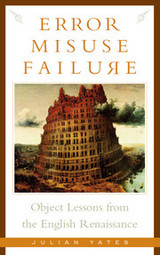
Error, Misuse, Failure
Object Lessons From The English Renaissance
Julian Yates
University of Minnesota Press, 2002
Explores what an object tells us about the culture that created it.
If certain objects work well, no one notices them. As with "black boxes," their success may be gauged by their relative invisibility-and this was the indirect goal of the objects that Julian Yates considers here: the portrait miniature, the relic, the privy (flush toilet), the printed text, and the priest-hole (a secret hiding place for Catholic priests in Protestant England).
Because each of these contrivances was prone to error, misuse, and sometimes catastrophic failure, they become in Yates's analysis an occasion for recasting the history of the English Renaissance as object lessons-"knowing from the point of view of the known." It is through such lapses-the texts and stories generated to explain away a relic that is too easily faked, a miniature that is too curiously real, the stench of a failing privy, a book that persistently sheds its pages, or the presence of so much "papist trash" in an ostensibly reformed England-that Yates recovers the silent work of "things" in cultural production.
Drawing object lessons from failing technological devices, Error, Misuse, Failure plumbs the foundations of Renaissance culture in England, recovering a curious language of mistakes, dirt, and parasitism that associates the failures of these "things" with the figures of Rome, Catholicism, and Sodom. Yates offers a mode of historical inquiry rooted in material culture, sensitive to the way humans induct nonhumans (animals, plants, and manufactured things) into their communities. Historically, the book offers a new set of stories about the rise of printing, the development of domestic architecture, and England's Catholic community-stories that remind readers of the ways in which attending to the history of nonhumans requires a radical rethinking of historical landmarks and boundaries.
Julian Yates is associate professor of English at the University of Delaware.
[more]
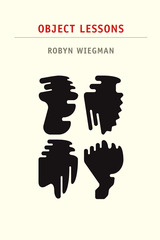
Object Lessons
Robyn Wiegman
Duke University Press, 2012
No concept has been more central to the emergence and evolution of identity studies than social justice. In historical and theoretical accounts, it crystallizes the progressive politics that have shaped the academic study of race, gender, and sexuality. Yet few scholars have deliberated directly on the political agency that notions of justice confer on critical practice. In Object Lessons, Robyn Wiegman contemplates this lack of attention, offering the first sustained inquiry into the political desire that galvanizes identity fields. In each chapter, she examines a key debate by considering the political aspirations that shape it. Addressing Women's Studies, she traces the ways that "gender" promises to overcome the exclusions of "women." Turning to Ethnic Studies, she examines the deconstruction of "whiteness" as an antiracist methodology. As she explores American Studies, she links internationalization to the broader quest for noncomplicity in contemporary criticism. Her analysis of Queer Studies demonstrates how the commitment to antinormativity normalizes the field. In the penultimate chapter, Wiegman addresses intersectionality as the most coveted theoretical approach to political resolution in all of these fields.
[more]
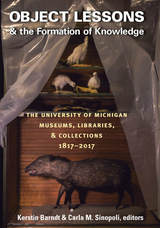
Object Lessons and the Formation of Knowledge
The University of Michigan Museums, Libraries, and Collections 1817–2017
Kerstin Barndt and Carla M. Sinopoli, editors
University of Michigan Press, 2017
Object Lessons and the Formation of Knowledge explores the museums, libraries, and special collections of the University of Michigan on its bicentennial. Since its inception, U-M has collected and preserved objects: biological and geological specimens; ethnographic and archaeological artifacts; photographs and artistic works; encyclopedia, textbooks, rare books, and documents; and many other items. These vast collections and libraries testify to an ambitious vision of the research university as a place where knowledge is accumulated, shared, and disseminated through teaching, exhibition, and publication. Today, two hundred years after the university’s founding, museums, libraries, and archives continue to be an important part of U-M, which maintains more than twenty distinct museums, libraries, and collections. Viewed from a historic perspective, they provide a window through which we can explore the transformation of the academy, its public role, and the development of scholarly disciplines over the last two centuries. Even as they speak to important facets of Michigan’s history, many of these collections also remain essential to academic research, knowledge production, and object-based pedagogy. Moreover, the university’s exhibitions and displays attract hundreds of thousands of visitors per year from the campus, regional, and global communities. Beautifully illustrated with color photographs of these world-renowned collections, this book will appeal to readers interested in the history of museums and collections, the formation of academic disciplines, and of course the University of Michigan.
[more]
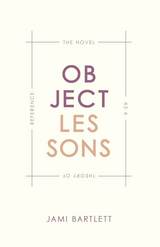
Object Lessons
The Novel as a Theory of Reference
Jami Bartlett
University of Chicago Press, 2016
Object Lessons explores a fundamental question about literary realism: How can language evoke that which is not language and render objects as real entities? Drawing on theories of reference in the philosophy of language, Jami Bartlett examines novels by George Meredith, William Makepeace Thackeray, Elizabeth Gaskell, and Iris Murdoch that provide allegories of language use in their descriptions, characters, and plots. Bartlett shows how these authors depict the philosophical complexities of reference by writing through and about referring terms, the names and descriptions that allow us to “see” objects. At the same time, she explores what it is for words to have meaning and delves into the conditions under which a reference can be understood. Ultimately, Object Lessons reveals not only how novels make references, but also how they are about referring.
[more]
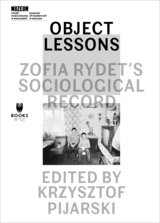
Object Lessons
Zofia Rydet’s Sociological Record
Edited by Krzysztof Pijarski
Museum of Modern Art in Warsaw, 2017
In 1978, Zofia Rydet (1911–97) began work on a monumental project that would come to be known as her “Sociological Record”: photographing the people of Poland at their homes, she produced an extraordinary archive of around twenty thousand negatives. The images include faces, interiors, furnishings, and more. The undertaking consumed Rydet so completely that she was never able to give it final shape through a book or an art show.
Object Lessons, a new volume of essays inspired by an exhibition at the Museum of Modern Art in Warsaw, helps to dispel the myths that have formed around the project in recent years and introduces the photographer to a new global audience. The essays here contextualize and interpret “Sociological Record” from different perspectives, opening up the work to further inquiry as both an object of interpretation and a subject of theoretical interest. Rydet herself remained unresolved over the question of how to define her work, leaving the viewer to ponder whether her magnum opus is a piece of art or science. What does remain undisputed is that “Sociological Record” is a striking testimony of its time.
A fascinating celebration of Rydet’s work that is sure to spur on fresh debate about art as a social practice and a tool of knowledge, Object Lessons reminds us of photography’s incredible power to provide a visual way of thinking and a provocative method for archiving the world.
Object Lessons, a new volume of essays inspired by an exhibition at the Museum of Modern Art in Warsaw, helps to dispel the myths that have formed around the project in recent years and introduces the photographer to a new global audience. The essays here contextualize and interpret “Sociological Record” from different perspectives, opening up the work to further inquiry as both an object of interpretation and a subject of theoretical interest. Rydet herself remained unresolved over the question of how to define her work, leaving the viewer to ponder whether her magnum opus is a piece of art or science. What does remain undisputed is that “Sociological Record” is a striking testimony of its time.
A fascinating celebration of Rydet’s work that is sure to spur on fresh debate about art as a social practice and a tool of knowledge, Object Lessons reminds us of photography’s incredible power to provide a visual way of thinking and a provocative method for archiving the world.
[more]
READERS
Browse our collection.
PUBLISHERS
See BiblioVault's publisher services.
STUDENT SERVICES
Files for college accessibility offices.
UChicago Accessibility Resources
home | accessibility | search | about | contact us
BiblioVault ® 2001 - 2024
The University of Chicago Press









